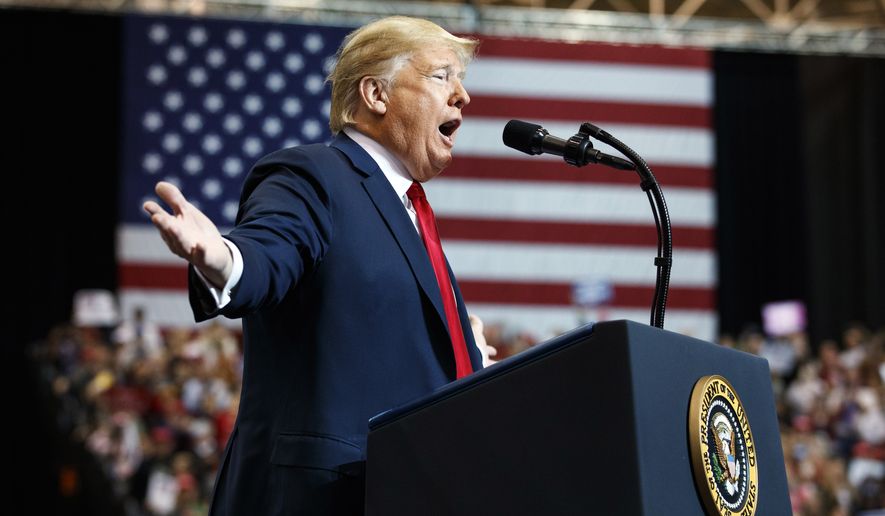President Trump intensified his closing campaign argument Monday in three key midwestern states, urging voters to “stop the radical resistance in its tracks” and to protect the gains of his political movement as voters decide control of Congress.
He and GOP leaders on Capitol Hill continued to express optimism over Tuesday’s elections, though the final indicators, from late-breaking polls to early voting tallies, suggested Democrats are poised for significant gains from Congress to governor’s mansions across the country.
More Democrats voted early than Republicans in Florida, home to a number of key races, while in Arizona, Republicans’ traditional voter-turnout advantage shrank in early voting, according to state statistics.
Mr. Trump, though, said he’s seeing evidence of a tide breaking for Republican candidates.
“I look forward to seeing what happens, because something is going on,” the president said in Cleveland. “There are a couple of honest polls that are showing some very, very good promise tomorrow. You’ve got to keep the movement going tomorrow.”
At stake are all 435 U.S. House seats, 35 Senate seats and 36 state governorships — and Mr. Trump’s ability to keep his agenda on track.
SEE ALSO: What to watch for on Election Day
“A good night [for the president] would be if Republicans hold the House and Senate and minimal losses in the governorships. If they can hold down their losses their to maybe three or four, that would be a good night,” said Alan I. Abramowitz, a political scientists at Emory University.
“A bad night would be lose the House and Senate, or even barely hold the Senate, a 50-50 Senate, lose 40 in the House, lose 8 to 10 governorships,” he said.
He, like most analysts and party officials, said the most probable scenario is in between — Democrats pick up more than the 23 seats needed to gain the majority in the House, while the GOP is likely to hold onto its Senate majority and possibly gain a few seats.
Democrats claim the momentum, and an edge in voter enthusiasm that is largely based on antipathy for Mr. Trump. In Virginia, former President Barack Obama told Democratic campaign volunteers that “the character of this country is on the ballot.”
“Who we are is on the ballot,” Mr. Obama said.
The party holding the White House has lost seats in the House in all but two elections in modern history. The average loss in the years since World War II is 24 seats.
House Speaker Paul D. Ryan, who is retiring at the end of this year, said he still thinks Republicans can limit the damage and maintain the majority.
“I feel like this is going to be really, really close,” he told Fox News.
The math in the Senate is better for Republicans.
Of the 35 seats up for election, 26 of them are held by senators who caucus with Democrats, leaving the minority party mostly playing defense.
Sen. Chris Van Hollen, chairman of Senate Democrats’ campaign committee, told CNN there’s a “narrow path” to a majority.
“It all depends on turnout,” he said. “I can tell you, the early voting has been really good.”
While three-quarters of voters report being generally satisfied with the economy, Mr. Trump’s combative style of leadership has combined with partisan rancor left over from the 2016 presidential election to keep his job-approval rating relatively low.
An ABC News poll this week placed his job approval at 40 percent, while CNN’s final survey put him at 39 percent, worst of any president heading into his first midterm, in records dating back to President Dwight D. Eisenhower.
CNN said 42 percent of voters said their ballot will be a chance to express opposition to the president, while for 28 percent it’s a chance to show support.
Republicans point to the strength of the economy as their chief selling point.
“Nobody in the White House has ever had the greatest economy in the history of our country. So it should be different,” Mr. Trump said Monday.
The president has kept up a record-setting pace of campaigning in this election cycle, holding 30 rallies since Labor Day and 53 events since taking office. He has campaigned in 24 states for Republicans.
Monday’s agenda included Ohio, Indiana and a late-night stop in Missouri.
Although it’s not a high-drama presidential election year, Mr. Trump is acknowledging more and more in the final days of this campaign that his agenda is hanging in the balance.
“The midterm elections used to be, like, boring, right?” the president asked supporters. “In a sense, I am on the ticket. You have to go out and vote.”
More than at any other time of this campaign, Mr. Trump described Election Day as a make-or-break moment for his presidency and the political movement that brought him to power.
“These are corrupt people,” the president said. “Tuesday is your chance to send a message to the Democrat mob and to everyone who has made it their mission to denigrate our movement and to divide our great nation. Tomorrow with your votes, you can stop the radical resistance in its tracks.”
Ford O’Connell, a Republican strategist close to the White House, said the final stops on Mr. Trump’s campaign swing highlight how the midterm can impact his reelection bid in 2020.
“The biggest worry for the White House in terms of re-election is making sure they have a Republican governor in Florida and Ohio because it just makes organizing those states all the easier,” he said. “If you look at his final travel schedule the two things that stick out on your map is Florida and Ohio, not just because of Senate races but because of gubernatorial races. They know that to win re-election they’ve got to win Florida and Ohio.”
⦁ S.A. Miller contributed to this report.
• Dave Boyer can be reached at dboyer@washingtontimes.com.
• Stephen Dinan can be reached at sdinan@washingtontimes.com.




Please read our comment policy before commenting.